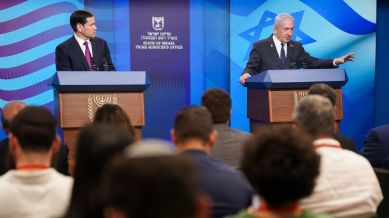Netanyahu says Hamas leaders won’t have immunity, doesn’t rule out further strikes
Rubio said Washington still had "strong relationships with our Gulf allies" when asked whether the strike had strained ties in the region.

Israeli Prime Minister Benjamin Netanyahu has said he will not rule out further strikes on Hamas leaders, telling reporters that they would not have immunity “wherever they are,” the BBC reported.
He was speaking at a press conference in Jerusalem alongside US Secretary of State Marco Rubio. Netanyahu said every country had the right “to defend itself beyond its borders.”
monthly limit of free stories.
with an Express account.
Last week, Israel targeted senior Hamas figures in Qatar, a close ally of the United States. Hamas said six people were killed in the strike but that its leaders survived. The move drew criticism from US President Donald Trump and prompted condemnation from Arab states.
When asked if the United States had been involved, Netanyahu told journalists: “We did it on our own. Period,” according to the BBC.
The meeting between Rubio and Netanyahu came as Arab leaders gathered at a summit in support of Qatar. Qatar’s prime minister called on the international community to stop applying “double standards” and to hold Israel accountable.
Rubio said Washington still had “strong relationships with our Gulf allies” when asked whether the strike had strained ties in the region. Qatar hosts a major US airbase and has acted as a mediator in indirect talks between Israel and Hamas.
On Sunday, Netanyahu said US-Israel relations were as “durable as the stones in the Western Wall” during a short visit there with Rubio and US ambassador Mike Huckabee.
The two leaders also discussed Israeli military plans in Gaza and settlement expansion in the West Bank. The Israeli army has demolished residential buildings in Gaza City and has ordered civilians to move south. The Israel Defense Forces estimate that around 250,000 people have already left, though many remain. Some Palestinians told reporters they could not afford to leave or said the south was unsafe due to air strikes.
The talks came ahead of next week’s UN General Assembly, where several countries including the UK, France, Canada, Australia and Belgium are expected to recognise the State of Palestine. The possible recognition has deepened debate in Israel over the future of the West Bank.
In late August, the Israeli government gave final approval for the E1 settlement project east of Jerusalem, which would effectively split the West Bank in two. Netanyahu said, “We are going to fulfil our promise that there will be no Palestinian state. This place belongs to us.”
Earlier this month, Finance Minister Bezalel Smotrich put forward a proposal to annex about four-fifths of the West Bank.
Since 1967, Israel has built around 160 settlements in the West Bank and East Jerusalem, now home to about 700,000 Israelis. Around 3.3 million Palestinians live in the same areas. The settlements are considered illegal under international law.
Rubio is also expected to visit the City of David archaeological park in occupied East Jerusalem. Critics told the BBC the project is being used to advance political aims at the expense of Palestinian residents.